Ashwagandha
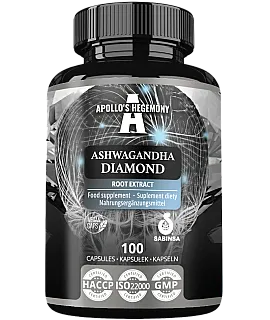
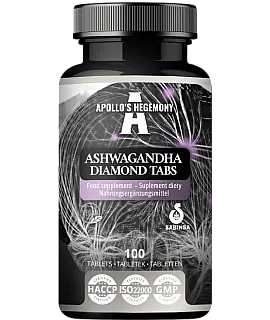



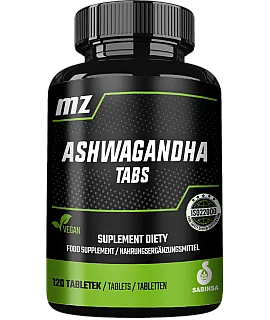
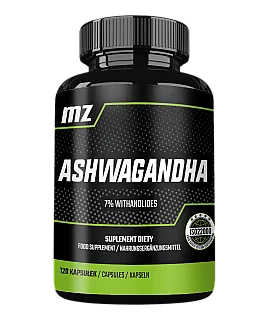
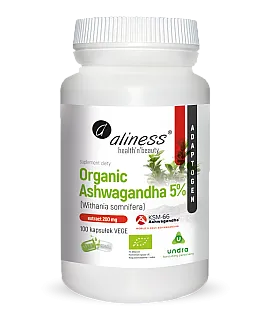
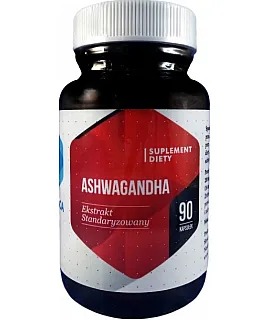
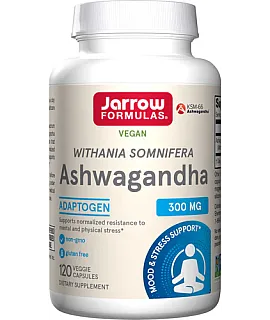
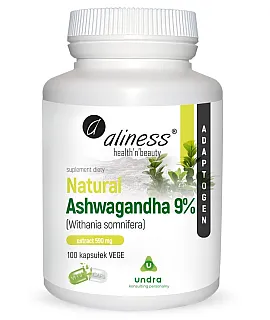
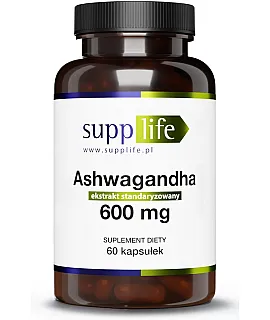
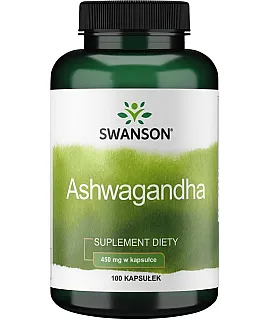
Ashwagandha, also known as Indian ginseng or sluggish vitania, is a dietary supplement that is gaining popularity among people looking for natural ways to improve their health and well-being. This adaptogenic root has been used in traditional Ayurvedic medicine for centuries, and modern research confirms its beneficial effects on the body.Read more
For whom is ashwagandha intended?
Ashwagandha is a dietary supplement suitable for people subjected to stress, fatigue and weakening of the body. Thanks to its adaptogenic properties, ashwagandha helps the body better cope with stressors, both physical and mental. People struggling with relaxation problems and disturbed emotional balance can also benefit from the beneficial effects of this supplement.
Ashwagandha is especially recommended for people with busy lifestyles, exposed to stress at work or in everyday life. This supplement can also help people who participate in sports, which is also a strong stressor for the body. Older people whose bodies are weakened can also benefit from ashwagandha supplementation.
However, it is important to note that ashwagandha should not be used by pregnant and breastfeeding women, or those taking sedative medications. If you have any doubts, it is always a good idea to consult your doctor before starting supplementation.
For what purpose is ashwagandha used?
Ashwagandha is used to improve overall health and well-being. Thanks to its adaptogenic properties, this supplement helps the body better cope with stress. Regular use of ashwagandha can help reduce symptoms of stress, such as nervous tension and lowered mood.
Another purpose of using ashwagandha is to support heart function and circulation. In cases of chronic stress, the heart can experience increased strain and is worth supporting.
Contraindications to using ashwagandha
Although ashwagandha is generally considered a safe dietary supplement, there are some contraindications to its use. First and foremost, ashwagandha should not be consumed by pregnant and breastfeeding women, as there is not enough research to confirm its safety in these groups.
People taking sedative drugs, such as benzodiazepines, should also avoid ashwagandha, as it may interact with these drugs and exacerbate their effects. Similarly, people with autoimmune diseases should consult a doctor before starting supplementation, as ashwagandha can stimulate the immune system.
Ashwagandha can also affect blood sugar levels, so people with diabetes should exercise caution and monitor glucose levels during supplementation. In rare cases, ashwagandha can cause gastrointestinal discomfort, such as diarrhea or abdominal discomfort.
How to supplement ashwagandha and in what doses?
Ashwagandha is most often available in the form of capsules containing a powdered extract of the plant's root. The recommended dose of ashwagandha can vary depending on the manufacturer and the concentration of the extract, so always follow the instructions on the package.
The standard dose of ashwagandha is 300-500 mg of the extract standardized to contain 5-7% vitanolides, taken twice daily. Some studies suggest that higher doses, up to 1000-1500 mg per day, may be more effective in reducing symptoms of stress and anxiety. However, it's always a good idea to start with a lower dose and gradually increase it, observing the body's reactions.
For best results, ashwagandha should be taken regularly for at least several weeks. The effects of supplementation can be felt after 2-4 weeks of use, but it is recommended to continue supplementation for 8-12 weeks to achieve full benefits.
Differences in effects depending on the dose of ashwagandha
The effects of ashwagandha can vary depending on the dose taken. Lower doses, in the range of 300-500 mg per day, are usually sufficient for those seeking an overall improvement in mood and a reduction in mild symptoms of stress.
Higher doses of ashwagandha, up to 1000-1500 mg a day, are often used by people struggling with chronic stress, anxiety or lowered mood. Research suggests that such doses may be more effective in reducing cortisol levels and alleviating symptoms of stress. Higher doses may also benefit physically active individuals.
However, it is worth remembering that increasing ashwagandha dosage should be done gradually and under the supervision of a doctor or supplement specialist. Doses that are too high can potentially lead to side effects, such as gastrointestinal discomfort or interactions with medications taken.
Key information about ashwagandha:
- Ashwagandha is an adaptogenic dietary supplement with beneficial effects on the body, especially in the context of stress management.
- This supplement is recommended for people subject to stress, fatigue and weakness, but is contraindicated for pregnant and breastfeeding women and people taking sedative medications.
- Ashwagandha helps reduce symptoms of stress and promote relaxation.
- The standard dose is 300-500 mg of the extract daily, but higher doses may be more effective for chronic stress.
- The effects of supplementation are usually felt after 2-4 weeks, but 8-12 weeks of use is recommended for full benefits